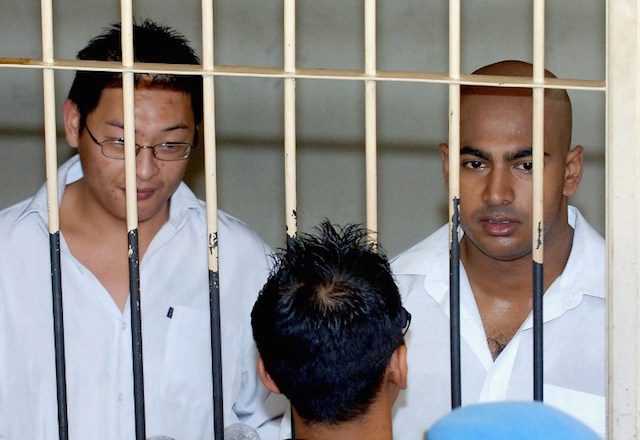SUMMARY
This is AI generated summarization, which may have errors. For context, always refer to the full article.

JAKARTA, Indonesia – Foreigners on death row in Indonesia have been denied basic rights and beaten for confessions, Amnesty International said Thursday, October 15 in a damning report that slammed the country’s continued use of the death penalty for drug-related crimes.
The London-based rights group also claims in a new report that foreign death row inmates were denied proper legal assistance and access to interpreters during their trials, and signed legal documents in a language they didn’t understand. (READ: Indonesia uses faulty drug data to justify death penalty)
The report “Flawed Justice” alleges numerous instances where Indonesia “flouted” protections for death row inmates, but made particular mention of breaches involving foreigners given the significant number facing the firing squad.
At least 35 of the roughly 120 prisoners awaiting execution in Indonesia are foreigners, Amnesty said. 12 of the 14 shot by firing squad this year were from abroad, including citizens of Australia, Brazil and the Netherlands.
All were put to death for drugs offenses under Indonesia’s tough anti-narcotics laws, invoking international outrage, but President Joko Widodo publicly refused to back down, vowing no mercy for traffickers. (READ: FAST FACTS: Executions in Indonesia)
Amnesty’s deputy director of campaigns Josef Benedict disputed Indonesia’s claim that it followed the law “to the letter” in carrying out these executions.
“Our report reveals a very different reality,” he told reporters in Jakarta.
“We’ve uncovered serious and endemic issues in Indonesia’s justice system.”
Benedict said in one case, a Pakistani prisoner was beaten for 3 days until he gave the confession that led to his death sentence, and later required kidney and stomach surgery.
A Nigerian man executed in April was initially named a citizen of the non-existant “Republic of Cordova”, while another was also mistakingly identified, delaying both quick access to consular assistance.
A Filipina convict Mary Jane Veloso, who has always maintained her innocence and said human-traffickers duped her, was provided a college student who didn’t speak her language as a translator during her trial.
The foreign ministry refuted the report’s claims.
“All legal rights for the convicts have been fulfilled according to the existing laws,” foreign ministry spokesman Arrmanatha Nasir told AFP by text message.
A spokesman for Indonesia’s justice ministry declined to comment saying he had not read the report.
Amnesty also condemned the Indonesian government for executing a mentally-ill Brazilian man, and for being one of just 6 countries worldwide to still execute drug convicts.
Several other foreigners, including French welder Serge Atlaoui and British grandmother Lindsay Sandiford, are awaiting death for drugs charges in Indonesia, but authorities have still not made plans for a new round of executions.
Indonesia resumed executions in 2013 after a hiatus of several years, and since then has put 19 prisoners to death, Amnesty research shows.
The execution in April of two Australians, a Brazilian and 4 Nigerians for drug offenses sparked international anger, with Australia temporarily recalling its ambassador from Jakarta. – Rappler.com
Add a comment
How does this make you feel?
There are no comments yet. Add your comment to start the conversation.